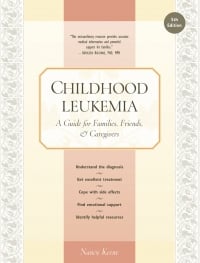Childhood Leukemia
Emotional Responses
Parents whose children are in remission think or speak of relapse with an almost palpable dread. Just the thought can cause an eruption of the same emotions that surged in them at diagnosis. Parents, their child, and the siblings may feel a wide array of emotions after a relapse—numbness, guilt, dread, anger, fear, confusion, denial, and grief.
I am a long-term survivor (30 years old), who first was diagnosed with ALL at age 8 and subsequently relapsed three times, at ages 13, 15, and 16. The first relapse was by far the worst to deal with emotionally. It had been five years since my diagnosis, so I went in for my last spinal tap and bone marrow. I had been off treatment with good counts for two years. My mother and I didn’t even wait for the test results; we went out to lunch and went shopping. Later that day, I called the clinic, and my doctor told me the bone marrow was fine, but she needed to talk to my mother. I heard my mother say, “No, no, oh no,” and she started to cry. I just stood there feeling numb, knowing the news was bad. The cancer had returned to my central nervous system. But at 13, I remembered clearly what I had been through, and all I could think was that it hadn’t worked. I told my parents that I wouldn’t go through treatment again. My father sat me down and gave me a reality check. He explained that I would die if I didn’t get treatment. He said, “If you don’t do it for yourself, please do it for me and your mom.” The next morning I went into the clinic and started all over again.
In addition to powerful emotions, parents often experience physical symptoms such as dizziness, nausea, fainting, and shortness of breath. They wonder how they can ask their child to endure treatment again. They wonder how they will survive it themselves. They may swing between optimism and panic.
I found that relapse was far worse than the original diagnosis. At diagnosis, after a certain period of adjustment, you think that treatment has a beginning, a middle, and an end. But relapse creates a bigger burden to accept. You begin to feel that maybe the disease is more powerful than the medicine. I found that for a while I just stopped functioning and thinking rationally. I felt like I was on a runaway freight train, hurtling toward an end that didn’t look so good anymore.
Table of Contents
All Guides- Introduction
- 1. Diagnosis
- 2. Overview of Childhood Leukemia
- 3. Acute Lymphoblastic Leukemia
- 4. Acute Myeloid Leukemia
- 5. Juvenile Myelomonocytic Leukemia
- 6. Chronic Myelogenous Leukemia
- 7. Telling Your Child and Others
- 8. Choosing a Treatment
- 9. Coping with Procedures
- 10. Forming a Partnership with the Medical Team
- 11. Hospitalization
- 12. Central Venous Catheters
- 13. Chemotherapy and Other Medications
- 14. Common Side Effects of Treatment
- 15. Radiation Therapy
- 16. Stem Cell Transplantation
- 17. Siblings
- 18. Family and Friends
- 19. Communication and Behavior
- 20. School
- 21. Sources of Support
- 22. Nutrition
- 23. Insurance, Record-keeping, and Financial Assistance
- 24. End of Treatment and Beyond
- 25. Relapse
- 26. Death and Bereavement
- Appendix A. Blood Tests and What They Mean
- Appendix B. Resource Organizations
- Appendix C. Books, Websites, and Support Groups

